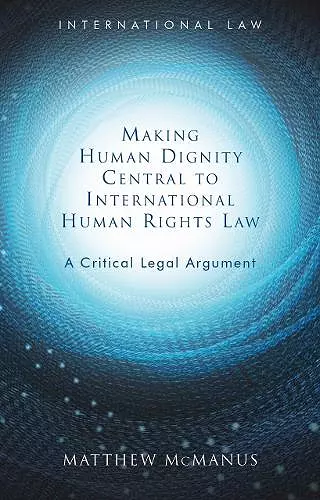Making Human Dignity Central to International Human Rights Law
A Critical Legal Argument
Format:Hardback
Publisher:University of Wales Press
Published:15th Oct '19
Should be back in stock very soon

• This book argues that human dignity is not just gloss. Rather, its protection and amplification should be understood as the overall end to which international human rights law aims • The book provides both a descriptive account of how human dignity and international human rights law have been linked in the past, as well as sustained theoretical and practical arguments on how to make the link even tighter and more valuable. • It will demonstrate the value of understanding human dignity as the end to which international human rights law strives through a number of prominent case studies and institutional analyses. • Most innovatively, it links these themes to the critical legal studies tradition. Critical legal studies has long been known to eschew constructive moral arguments in favour of critique. This book argues that it is that in an age of post-modern conservatives such as Donald Trump and Victor Orban, internationalists and progressives need to provide more comprehensive and inspiring projects.
This book argues how human dignity flows from an individual's capacity for self-authorship as defined by the set of expressive capabilities s/he possesses, demonstrating how such a conception of dignity can enrich international human rights law by making the amplification of human dignity its fundamental orientation.In recent years, there has been an explosion of writing on the topic of human dignity across a plethora of different academic disciplines. Despite this explosion of interest, there is one group - critical legal scholars - that has devoted little if any attention to human dignity. This book argues that these scholars should attend to human dignity, a concept rich enough to support a whole range of progressive ambitions, particularly in the field of international law. This book synthesizes certain liberal arguments about the good of self-authorship with the critical legal philosophy of Roberto Unger and the capabilities approach to agency of Amartya Sen, to formulate a unique conception of human dignity. The author argues how human dignity flows from an individual's capacity for self-authorship as defined by the set of expressive capabilities s/he possesses, and the book demonstrates how this conception can enrich our understanding of international human rights law by making the amplification of human dignity its fundamental orientation.
ISBN: 9781786834645
Dimensions: unknown
Weight: unknown
272 pages